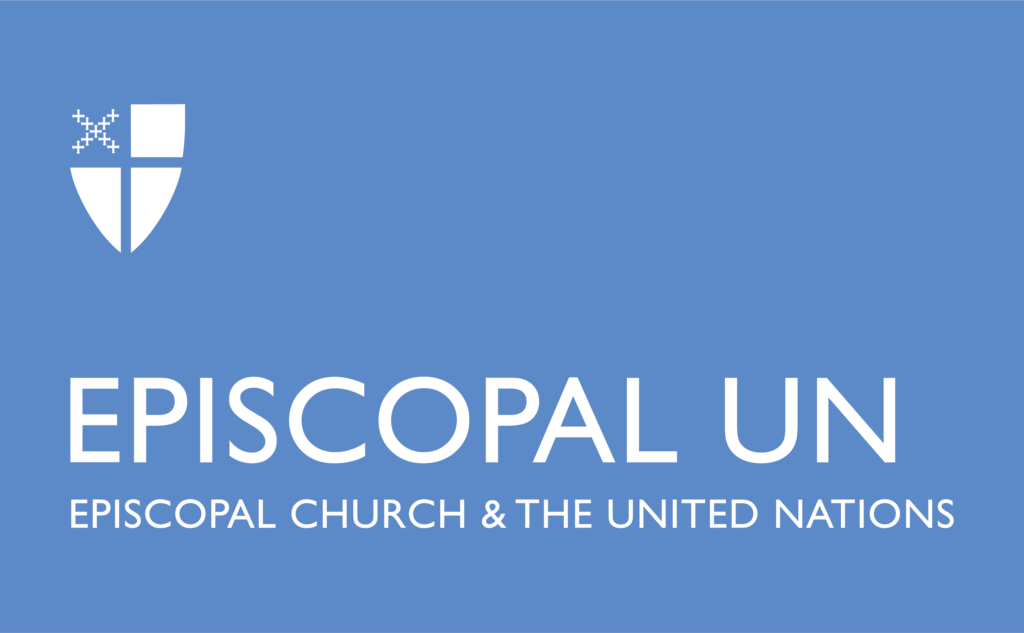Welcome to UNCSW 65: Our Episcopal presence
By: Lynnaia Main, Episcopal Church Representative to the United Nations
As many of you reading this blog will know, Episcopalians, alongside their Anglican family, have attended the United Nations Commission on the Status of Women and the United Nations’ World Conferences on Women for decades. During the UNCSW’s 64th session last year, with its focus on the 25th anniversary of the Beijing Declaration and Platform for Action, Episcopalians at that gathering reviewed the Episcopal engagement of the last 25 years. We give thanks to God for that opportunity which brought to our attention, once again, the power and beauty of grassroots, collective action organized by and on behalf of women and girls.
Indeed, we learned from our pioneering predecessors that The Episcopal Church’s grassroots efforts to promote gender justice and women’s empowerment, through the former churchwide Offices of Women in Mission and Ministry and then Women’s Ministries, along with other churchwide organizations such as Anglican Women’s Empowerment, Episcopal Women’s Caucus, National ECW and Daughters of the King – not forgetting diocesan, parish-level and local women’s groups – have been by far The Episcopal Church’s largest and most important engagement with the United Nations. That remains true today. In fact, I have been told by The Reverend Margaret Rose, Presiding Bishop’s Ecumenical and Interreligious Deputy and former Director of the Office of Women’s Ministries, that “it is thanks to the women” and at the suggestion of a former Anglican Communion Observer – leading to a decision by Executive Council – that The Episcopal Church pursued its own ECOSOC consultative status at the UN. We honor and give thanks to God to everyone who paved the way for us to be here at UNCSW 65.
The might of these annual gatherings, the revolutionary ways they shape our Church, are not to be underestimated. The Church’s UNCSW grassroots and accredited institutional presence has continued every year, in various forms. In 2014, The Episcopal Church obtained ECOSOC consultative status and, through the Presiding Bishop’s offices, began to bring accredited Episcopal delegates to United Nations meetings and participate in UN representation and advocacy in a more pronounced way.
This year, Presiding Bishop Curry has nominated six accredited delegates from provinces around the Church to participate and represent him and the wider Church on his behalf. They are Ms. Maria Gonzalez, Diocese of Olympia (Province VIII), Ms. Tatiana Hoecker, Diocese of West Texas (Province VII), Ms. Coromoto Jimenez de Salazar, Diocese of Venezuela (Province IX), Ms. Ellen Lindeen, Diocese of Chicago (Province V), Ms. Erin Morey, Diocese of Pittsburgh (Province III), and Ms. Yunjeong Seol, Diocese of New York (Province II). Additionally, Ms. Clare Hendricks, Diocese of Montana (Province VI) serves as the Episcopal provincial representative to this year’s Anglican Communion delegation. We look forward to introducing you to them over the next two weeks through this blog series. You can find their biographies on The Episcopal Church’s UNCSW webpage.
The Presiding Bishop’s delegation has a specific role: to represent and advocate. The delegates apply for this opportunity the year ahead of UNCSW, must have the backing of their Bishop, and are nominated by the Presiding Bishop to represent him. They complete on average three months of training through study and monthly conference calls, with a very specific focus on what it means to represent and advocate for the priorities laid out in the Presiding Bishop’s written statement to that UNCSW session.
The written statement summarizes the Church’s position on the UNCSW meeting’s theme(s) for the year in which it is submitted. The statement is diligently researched and based on General Convention resolutions, an understanding of the Presiding Bishop’s and Church’s priorities and a contextualized, nuanced understanding of the major themes that require attention at the UN. This year’s statement addresses three priorities:
- Prioritize marginalized women and girls in planning, resource allocation and programs
- Increase women’s access to power and decision-making positions
- Promote gender equality education and eradicate violence against women and girls
Once the statement is submitted in October, the Presiding Bishop’s delegation uses it as a tool to share the Church’s priorities in their networking, representation, advocacy and personal reflections at UNCSW. Their role is two-fold: 1) to represent and advocate based on this statement and 2) to take their experiences back home to lift up and empower others locally. The delegates shared their thoughts, hopes and passions about the work to come in a pre-CSW parallel event on March 11th, “Welcome to UNCSW 65: Meet the Presiding Bishop’s Delegation”. The recording, PowerPoint and speaker bios are available on The Episcopal Church’s UNCSW webpage, and you will have the opportunity to hear from them via this blog series and our social media platforms over the next few days. The six-person delegation is supported by an amazing leadership team consisting of former Presiding Bishop’s delegates and staff of the Presiding Bishop and Episcopal Relief & Development, whose biographies also can be found on The Episcopal Church’s UNCSW webpage.
In addition to the Presiding Bishop’s delegation, a second accredited delegation from Episcopal Relief & Development is attending UNCSW this year under the leadership of Dr. Chiseche Mibenge, Director of Gender Initiatives, and the umbrella of The Episcopal Church.
And what has happened to that grassroots presence? With an historic attendance of 10,000 accredited UNCSW representatives this year, and 25,000 participants registered at NGO CSW’s Virtual Forum (according to statistics reported today by NGO CSW), we can be certain that our wider, faithful Episcopal presence remains as strong and intact as ever amongst this number. From decades-long pioneers to first-time attendees, organized groups to individuals, 80-something grandmothers to babies, we are many, many Episcopalians at UNCSW. We all count, we all represent our beloved Church and reflect Jesus’ love and concern for women, girls and all persons in our unique ways. We are a mighty force, through the power of God’s love and the Holy Spirit. We reflect the diversity of our Church in our priorities, perspectives and experiences.
We continue, each year, to walk alongside our Anglican Communion delegations and wider Anglican family at CSW, through joint meetings, worship, fellowship and advocacy. We work closely with our faith-based partners and coalitions to achieve common goals that will advance the empowerment of women and girls.
UNCSW in COVID time
The importance of our Episcopal presence at UNCSW is heightened considering the tragedies and setbacks that women and girls have encountered over the past year of the COVID-19 pandemic. Lopa Banerjee, Director of the Civil Society Division of UN Women, reported to Ecumenical Women’s Orientation Day this past weekend that women account for 70% of health care workers and front-line workers taking care of the world, but in the most fragile and insecure jobs. They have dropped out of the economy and suffered more job losses because their jobs were the least secure and the first to go. They have an unbearable care burden, three times as much as men before the pandemic, and that has risen exponentially. They have also been in lockdown with their abusers: according to the UN Secretary General’s report on Beijing +25, at the beginning of 2020, 18% of women and girls aged 18-49 years already had faced intimate partner violence. Since COVID, that has increased 20 – 40% in countries across the world. Yet, more than 40% of women who experience violence do not report it. COVID has highlighted the fragility of our half-broken systems and how easily the progress of half the world’s population can slide into oblivion.
The theme of this year’s UNCSW 65th session, “Women’s full and effective participation and decision-making in public life, as well as the elimination of violence, for achieving gender equality and the empowerment of all women and girls” reveals further tragic statistics reported in the last few days. According to Banerjee, the number of women parliamentarians has increased since 1995, but still only represent 25% worldwide. And yet, they are half the world’s population. Men are 75% of parliamentarians, 73% of all managerial positions, 70% of climate negotiators and almost all peace negotiators. At the current state of progress, it is expected that gender parity will not be reached in national legislatures before 2063 or among heads of governments before 2150. Another 130 years away.
The vastness and seriousness of the COVID crisis, and the critical lack of gender parity an justice, calls for action from all of us. Advocacy, education, prayer and mutual support, in Christ’s name and with God’s help, is our common task. Please join us in our Episcopal presence over the next two weeks as we learn and present these issues and reflect together on how our Church can tackle them. Join our wrap-up discussion on March 25th, “Taking It Back Home: Report Back from the Presiding Bishop’s Delegation” when our delegation will report back on its work and reflect together on next steps. For more information and to follow The Episcopal Church’s and Anglican Communion’s delegations and wider presence, visit The Episcopal Church UNCSW webpage and follow social media hashtags #EpiscopalCSW, #EpiscopalUN, #CSW65 and #GenerationEquality.
About the author: Lynnaia Main serves as The Episcopal Church Representative to the United Nations, a member of the Global Partnerships team. She loves serving Jesus and her fellow Episcopalians by lifting up their people, voices and ministries within the UN community and by nurturing relationships with member states, UN entities, faith-based partners and civil society. She advocates for our Church’s concerns and policies in partnership with the Office of Government Relations, accompanies and advises Episcopalians in their UN engagement and collaborates with the Anglican Communion, faith-based and civil society organizations. She has studied and worked in international relations and political science fields in academic, United Nations and business settings in the United States, France and South Africa for more than 25 years. She hails from southern New Jersey and is a warden and devoted member of the Eglise française du Saint Esprit in the Diocese of New York. She has served on previous UNCSW leadership teams and currently serves on the leadership team of the Presiding Bishop’s delegation to UNCSW 65.


